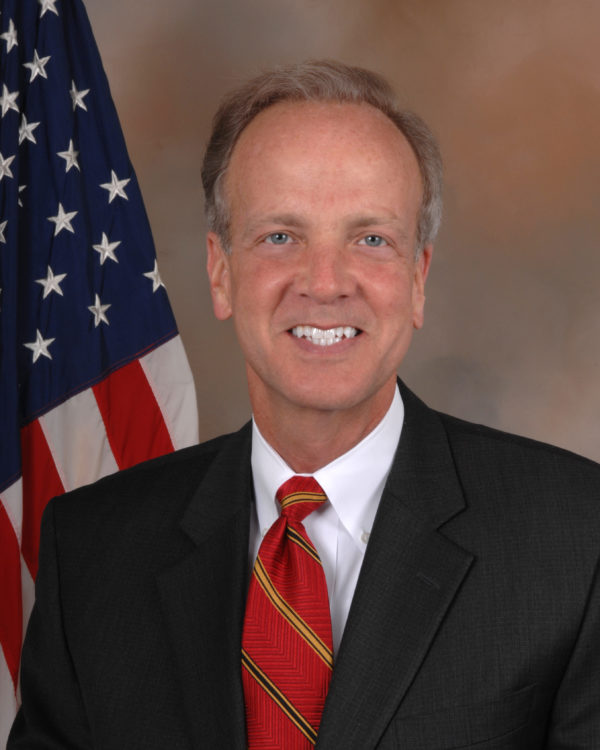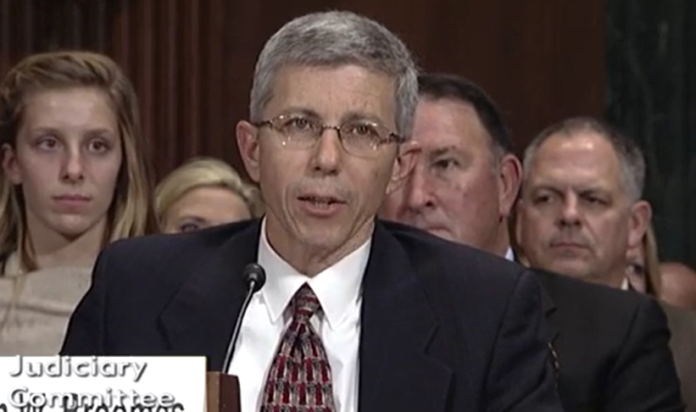The Twitterverse could barely contain itself over the weekend.
In the hours after U.S. District Judge John Broomes ruled in favor of two churches challenging Gov. Laura Kelly’s executive order limiting mass gatherings at religious events, social media erupted.
There were calls for his impeachment. Some called him an “imbecile.” Others referred to him as a “moron.” There was a reference to him being a “rusty tool.”
As much as Kansas Health Secretary Lee Norman had become a cult hero on social media recently, Broomes swiftly became a social media scourge for anyone who thought he was putting public health at risk. Even Norman took a swipe at the judge’s ruling on social media.

But for all the heat he’s taken, Broomes has been described by supporters as a talented jurist with a deep respect for the law who treats litigants fairly.
His decision rippled across the country, where there are several cases with churches challenging restrictions on mass gatherings and social distancing with the country in the grips of a pandemic.
“Gov. Kelly’s public health order does not violate religious freedom; it ensures that the government is not favoring some people’s religious practices in a way that endangers other people’s lives,” said Rachel Laser, president of Americans United for Separation of Church and State.
Nominated to the bench by President Donald Trump in 2017, Broomes is one of the two newest judges to the federal court in Kansas. The Senate confirmed his appointment in April 2018, just a couple months before Holly Teeter was confirmed.
With a “qualified” rating from the American Bar Association, Broomes whizzed through his confirmation hearing without so much as a question from senators on the Judiciary Committee.
During the brief 2017 hearing, Broomes, a longtime oil and gas lawyer with a degree in petroleum engineering, introduced his family, including his wife of 26 years and his six children.
He talked about his son Adam almost dying about 10 years earlier in a car crash.
A questionnaire and biography filed with the Senate Judiciary Committee gives some insight about Broomes’ perspective as a jurist and the nontraditional way he became a lawyer long after earning an undergraduate degree.
Born in 1969 in Louisiana, Broomes attended Austin Community College in Austin, Texas, and Delgado Community College in New Orleans in 1991.
The New Orleans native received a bachelor’s degree in petroleum engineering from the University of Texas in 1991.
After college, Broomes joined the U.S. Navy and became a submarine officer aboard the U.S.S. Hammerhead and the U.S.S. Tennessee. He was honorably discharged in 1996.
A year after leaving the Navy, he joined the telecommunications company Omnipoint Communications — later merged with T-Mobile — as a project manager.
He later went to work as a project manager and as a laboratory manager for Koch Industries.
Broomes did not enroll in law school until 2000, when he entered Washburn University Law School on a full scholarship. He graduated summa cum laude in 2002.
Broomes went on to clerk for U.S. District Judge Monti L. Belot from 2003-2006 and for Magistrate Judge Donald Bostwick in 2003. He joined the Hinkle Law Firm in 2007. The firm did not return phone calls seeking comment about Broomes.
Senate records show that Broomes’ legal work focused on two areas: working as outside counsel for several out-of-state clients and working with clients in Kansas.
His clients included small- to midsize companies that were publicly traded as well as individuals and small businesses.
His work in oil and gas included contracts, property law, regulatory law, taxes, insurance-related matters and some criminal law.
Broomes told the Senate that he routinely donates legal work to individuals who might not otherwise be able to afford the assistance.
He said his donated legal work included helping a police officer in a dispute with an insurer after the officer was injured in the line of duty.
The insurance company wanted to terminate benefits even though the officer was severely and permanently disabled.
The bio filed with the Senate gives some insight into how Broomes became a judge.
In December 2016, he expressed an interest in being a federal judge to Sens. Pat Roberts and Jerry Moran, who supported his nomination to the federal bench.
A Capitol Hill source said Broomes stood out from other candidates because of his unorthodox path to a legal career, which didn’t start until after he had served in the Navy.
It was believed that Broomes had a variety of life experiences, including time as a submariner and attending a community college, that would serve him well as a judge.
He also was seen as someone who would read laws narrowly as they are written rather than as a judicial activist.
Like the metaphor once used by Chief Justice John Roberts, Broomes sees himself as a baseball umpire.
“I agree with Justice Roberts’ metaphor in the sense that it reflects the role of the judge in the adversarial process,” Broomes said in a Senate questionnaire.
“Like an umpire, the judge’s role is not to assist or advance the cause of one party over another, but rather to oversee the proceeding as an unbiased, impartial arbiter,” he wrote.
The congressional source described Broomes as “down to Earth,” “straightforward” and “articulate.” The source said Broomes had a “strong moral compass.”
Two years ago on the Senate floor, Moran called Broomes a “highly qualified individual” and a “well-respected attorney.”

“In my conversations with him over the last year, he expressed a judicial philosophy that is dedicated to the interpretation of the law as written, recognition that no person is above the law and treatment for all litigants in a fair and legal fashion,” Moran said the day that Broomes was confirmed.
Moran read a letter into the record from Washburn University law professor David Pierce, chair of the school’s business and transactional law program.
“He found Mr. Broomes to be ‘the most gifted legal mind he had ever encountered’ and ‘equally important, he is an honest and principled person and among the very best lawyers I know,'” Moran said in quoting the letter.
By May 2017, Broomes had met with lawyers from the White House counsel’s office and the Office of Legal Policy. He was nominated for the judgeship in September 2017.
The questionnaire filed with the Senate Judiciary Committee provides some flavor of Broomes’ judicial philosophy.
He was asked if he could understand people who have been disenfranchised and what life experiences would lead him to a sense of empathy.
“I think each person brings with them a unique set of life experiences that no other person can completely understand,” he wrote in the questionnaire. “In that sense, I will never know exactly what it is like to be someone else.
“I do not think any of my life experiences should bear on the decisions I would make as a judge because the law requires, and the people deserve, judges whose decisions are not dictated by their life experiences, but by the law.
“If confirmed I would abide by the rule of law and fulfill my oath of office.”
In the questionnaire, Broomes was asked about his public opposition to abortion.
“I believe that the rule of law transcends a judge’s personal beliefs,” Broomes wrote.
“Lower courts must follow the controlling decisions of higher courts in our judicial system.
“If confirmed, I will faithfully apply all controlling precedents of the United States Supreme Court and the United States Court of Appeals for the Tenth Circuit,” he wrote.
Over the years, Broomes has contributed to Republican candidates, including Mike Pompeo’s 2010 campaign for Congress, Todd Tiahrt’s campaign for U.S. Senate and former presidential candidate Mitt Romney.
In 2012 and again in 2014, Broomes served on the campaign committee for former state Rep. Dennis Hedke, the judge’s bio reflects. Broomes said in his bio that he helped Hedke develop campaign materials and place yard signs.
A conservative, Hedke said he thought criticism of Broomes over his decision from Saturday was unfair.
“I think he understands the law very thoroughly,” said Hedke, who has known Broomes since about 2008.
“The blowback that he’s received is probably typical of people that don’t understand the law and do not have an appreciation for the difficulties that some of these decisions might render.”
Broomes listed a number of memberships on his Senate questionnaire from 2017, including the National Rifle Association from 2001 to 2007, the Home School Legal Defense Association since 1999, the Kansas Independent Oil and Gas Association since 2015, a member of New Hope Bible Church since 2014 and a couple homeowners associations.
It was not known to what extent Broomes is still a member of any of those organizations now that he’s a judge.













